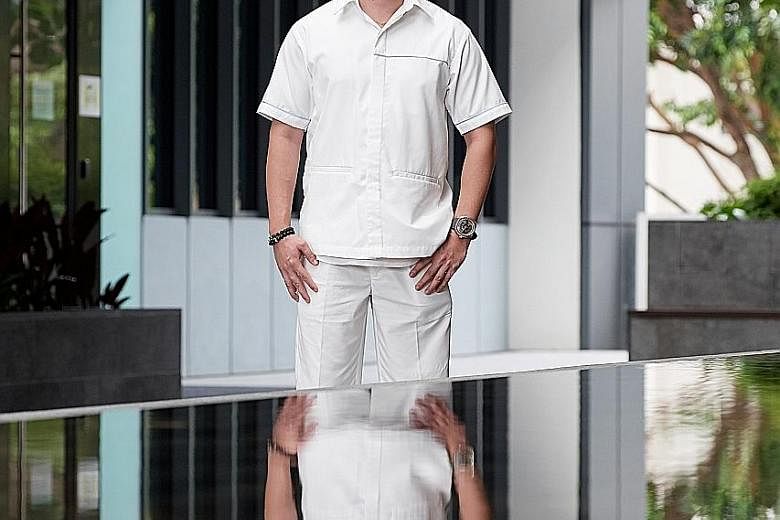When he was seven years old, his mother ran away from home and Mr Rayson Choo and his father, a security guard, spent weeks scouring the island hoping to find her.
"My father was frantic, and we even made a police report," said Mr Choo, 28. "I wasn't sure what was going on. I only knew that my mum wasn't coming home. I was crying, upset and afraid."
Mr Choo, who works as a psychiatric nurse, said about a month after her disappearance, his father, who was then in his 40s, received a letter from his mother, a schizophrenia patient.
She wanted a divorce.
"It shocked my father," he said. After the divorce, his father got custody of him.
That was his first brush with mental illness. For years afterwards, Mr Choo, an only child, struggled to understand his mother, her illness and how it affected their family.
-
GENERATION GRIT:
Know of a Singaporean aged 35 or below who has shown grit amid life's adversities? E-mail us at stnewsdesk@sph.com.sg
Mr Choo said: "Up till then, she was a normal mum. She would cook for me, take me shopping. I never noticed anything wrong."
He remembers that during his parents' frequent arguments, his mother would accuse his father of performing black magic on her - a delusion that he later realised stemmed from her mental illness. She would also threaten divorce.
"Perhaps those were signs, but I didn't understand them," he said.
His primary school classmates teased the shy and timid child, calling him "motherless", causing his grades and self-esteem to suffer. "I was pretty small in size and was a sensitive child. The bullying only stopped as I grew older."
His father tried to explain to him about his mother's illness, but he was more concerned with school, friends and computer games.
He dreaded the weekly meetings with her that were part of the custody arrangements. Together with his father, they would take her out to eat or watch a movie. Sometimes it meant going to visit her in the Institute of Mental Health.
If she was in a foul mood, those visits often ended with her cursing and swearing at them, and sometimes she turned violent.
"I was scared of her," he admitted. "She behaved very differently from normal people, blabbering loudly in public or having weird antics. I felt ashamed to have a mum like that. I would look at other families around me, and wish ours were complete."
However, things took a turn for the better when his father remarried a year after the divorce.
His stepmother quit her job as a property agent to take care of him. She treated him like her own son, said Mr Choo. "With her help, I topped the class in Primary 4. She sacrificed a lot to make sure I was all right and doing well in school."
Nursing was the last of 10 choices he indicated when selecting a polytechnic course after his O levels, said Mr Choo, who has been with the IMH for four years.
"I was a bit shocked to be given my last choice. But people around me had said before that I seemed to suit the role of a nurse, so I decided to go for it."
He graduated from Nanyang Polytechnic with a diploma in nursing in 2011. Months into his first nursing job, he was fired by the private clinic where he was working for underperforming.
In 2014, he decided to join the IMH and train to be a psychiatric nurse, motivated mainly by the desire to learn more about taking better care of and communicating with his mother. His mother is no longer a patient with IMH, but her former case manager, Ms Gemma Fernandez, has seen the rapport between mother and son grow since getting to know them in 2011.
Ms Fernandez, 52, an IMH senior case manager, said that Mr Choo's maturity and calm demeanour have helped his mother's condition improve. "Rayson knows how to connect with his mother despite their past. He knows how to engage her without agitating her."
She added: "Rayson strikes me as person who has a deep sense of empathy, which is important for his profession. Being able to get into the other person's shoes and understand the situation, it isn't easy for a young person to do that."
Now Mr Choo and his mother, who is in her late 50s, enjoy a close relationship and talk on the phone every day. She lives alone and, with medication, her condition has improved.
"Sometimes she still acts up, she would call me names and say mean things. But I'm able to deal with it better because now I know it's a result of her illness," said Mr Choo. He supports her financially and takes her out at least once a week to eat and watch movies.
One thing he enjoys is observing his mother in the movie theatre. "I watch her expressions, how she reacts to a touching scene on screen.
"Sometimes she cries. I've learnt that while she's suffering from a mental disorder, she's still very much human and responds to the same touching scenes that you and I respond to," he said, adding that he feels his family is complete now.
Caring for his mother and facing the challenges resulting from her mental illness have also helped him to be a better psychiatric nurse. "It's taught me empathy. I know how it feels to be a caregiver and it's helped me place myself in the shoes of patients and their families."


